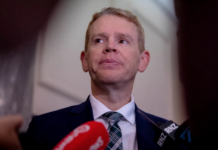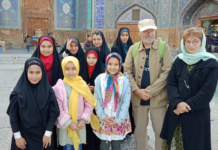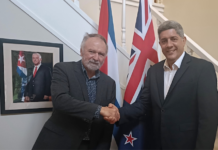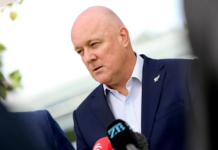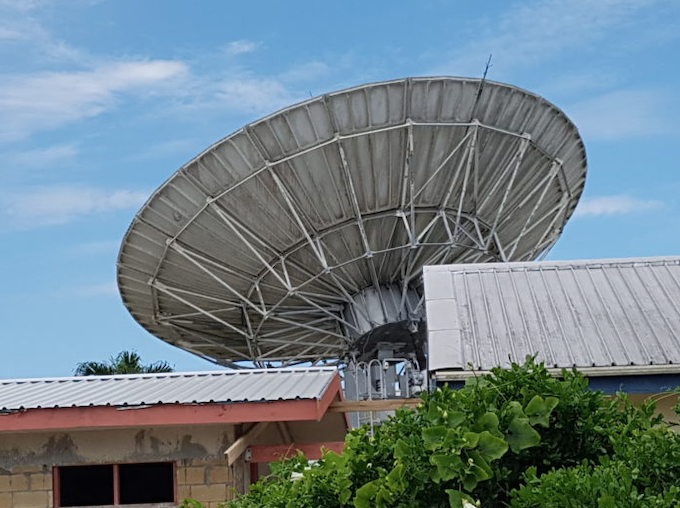
By Kalino Latu and Philip Cass in Auckland
Lack of backup satellite and cable links in the wake of Tonga’s volcanic eruption at the weekend reignites debate over the government’s plans to secure communications.
Communication with Tonga remains intermittent after the Hunga Tonga-Hunga Ha’apai eruption and tsunami severed the kingdom’s undersea cable connection with the rest of the world.
The crisis has renewed debate over previous government decisions which have been the subject of controversy and court cases.
- READ MORE: Tongan volcanic eruption reveals the vulnerabilities in global telecommunications
- Tonga’s undersea communications cable could take weeks to repair
- Why the volcanic eruption in Tonga was so violent, and what to expect next
- Other APR reports on the tsunami
It could be weeks before services are fully restored.
The 827km cable between Tonga and Fiji was cut when the volcano exploded. The break is located 37km from the capital, Nuku’alofa.
A cable connecting Tongatapu to other islands in the archipelago has been severed about 47km from Nuku’alofa.
A submarine cable repair ship is expected to sail from Papua New Guinea in the next few days.
Some communication with Tonga is possible via satellite. It is understood some people have been able to use the University of the South Pacific’s satellite connection to contact New Zealand from Ha’apai.
A New Zealand resident in Mangawhai, north of Auckland, has been in contact with his colleagues in Tonga via satellite text phone, 1News reported today.
However, Tonga Cable Ltd chair Samiuela Fonua said the lingering ash cloud was continuing to make even satellite phone calls abroad difficult.
Fonau said Tonga had been talking with New Zealand about establishing a second international fibreoptic cable, but any long-term solution was difficult.
The Kacific controversy
The government of the late prime minister ‘Akilisi Pohiva believed the best option was for Tonga to spend its money in building a satellite back up service.
The Pohiva government had made a 15-year deal with Kacific to establish a satellite backup link, but this was cancelled by the Tu’ionetoa government.
As Kaniva News reported in June last year, Kacific Broadband Satellites International Ltd provided emergency broadband services to Tonga when the undersea cable was severed by a ship’s anchor in 2019.
The Tongan government and its subsidiary Tonga Satellite Ltd later signed an agreement with Kacific for the supply of satellite broadband for a fee of US$5.76 million, which was due on June 15, 2019.
The fee was not paid and the company took Tonga to court in Singapore to enforce payment of the debt. The government then tried to take TSL off the kingdom’s company registry. This was overturned by the Tongan Supreme Court.
“We came to Tonga’s aid during its hour of need,” company CEO Christian Patouraux said at the time.
“It is deeply disappointing that Kacific has to undertake legal proceedings.
“The Tongan Government has benefited from millions of dollars of payments from international aid and infrastructure agencies to fund e-government initiatives and strengthen digital access over the last 10 years.”
The Hawaiki deal
The current Prime Minister, Siaosi Sovaleni was at the centre of a controversial deal with internet provider Hawaiki when he was Minister of Environment and Communications.
Sovaleni signed a TOP$50 million (NZ$32.5 million) contract.
Tonga paid TOP$6 million (NZ$4 million) so that the Hawaiki cable connecting New Zealand and Australia to Hawai’i and Los Angeles was connected to the Vava’u fibre cable in Tonga.
However, in 2019 Tonga Cable Ltd (TCL) director Paula Piveni Piukala and Minister of Trade and Economic Development Tu’i Uata were sent to Auckland to seek advice on the deal.
Uata said TCL had questioned whether the large sums being paid from taxpayers’ money were justified.
Piukala said at the time it “did not make sense” to pay such a large amount of money just in case the cable might be damaged in the future.
Tonga also had an agreement with French company Alcatel for the provision of a fibreoptic cable system connecting Nuku’alofa and Vava’u with a branch to Ha’apai.
The World Bank
The World Bank has funded $50 million for Tonga’s high-speed internet cable which was launched in 2013.
Tonga asked the bank to also fund a back up, or redundancy, cable but the bank said it was not financially viable.
Kalino Latu is editor of Kaniva Tonga. Asia Pacific Report collaborates with Kaniva News.








